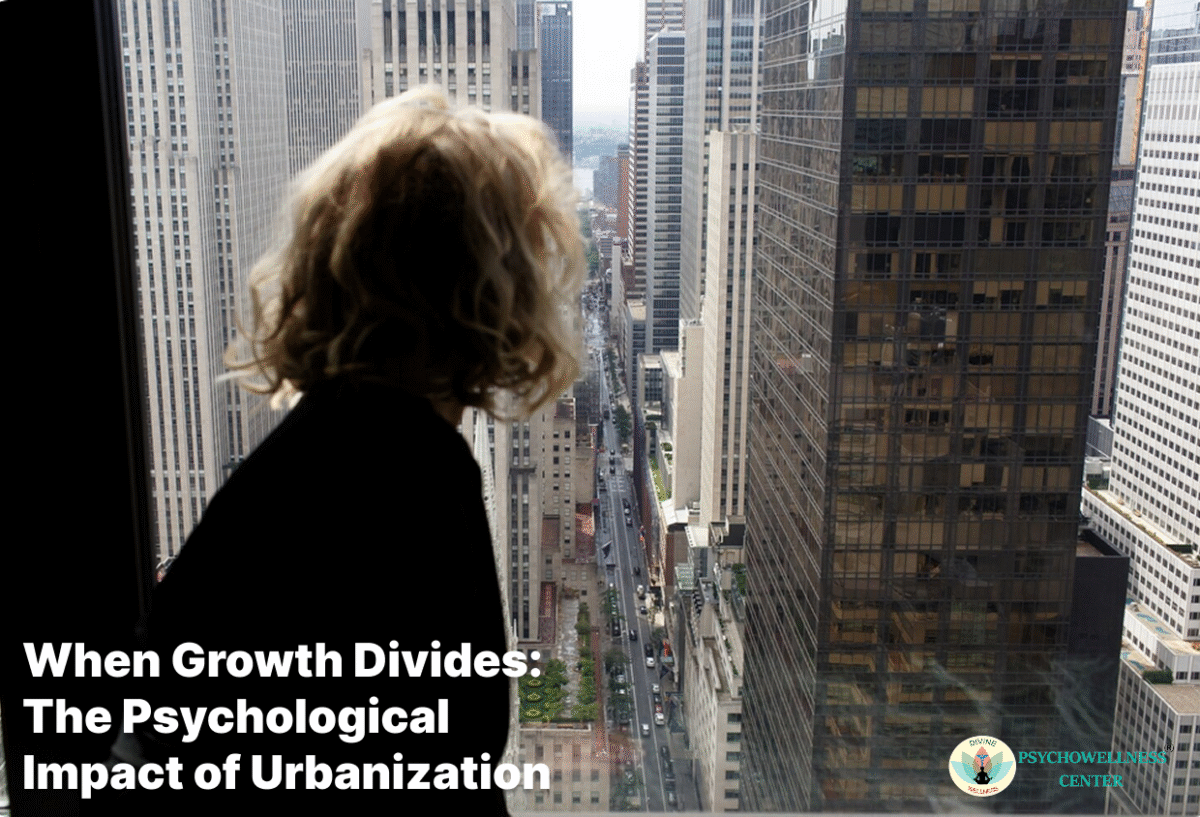Urbanization is one of the defining phenomena of the 21st century. Cities around the world, including in India, are expanding at unprecedented rates, bringing economic opportunities, technological advancements, and cultural exchange. Yet, this rapid growth comes with complex psychological and social consequences. While urbanization can foster progress, it can also create emotional, cognitive, and societal challenges, dividing communities and affecting mental health in profound ways.
The Double-Edged Sword of Urban Growth
Urban growth offers numerous benefits: increased employment, better education, improved healthcare access, and diverse social opportunities. However, as cities expand, the psychological cost of urban living becomes apparent. High population density, traffic congestion, noise pollution, and environmental degradation can all contribute to chronic stress, anxiety, and decreased life satisfaction.
Research in environmental psychology suggests that exposure to overcrowding and sensory overload can elevate cortisol levels, increase irritability, and impair decision-making. Urban residents may experience a constant “mental load” as they navigate busy streets, competitive workplaces, and the pressure to conform to fast-paced city lifestyles.
Social Fragmentation and Isolation
One of the less visible consequences of urbanization is the erosion of community bonds. Traditional neighbourhoods often offer social support, collective identity, and a sense of belonging, all protective factors for mental health. As cities grow, people may live in high-rise apartments with limited interaction with neighbours, contributing to social isolation.
Psychologists have noted that chronic social isolation is linked to depression, anxiety, and cognitive decline. In urban India, migrants often face displacement stress, moving from villages or small towns to metropolitan areas where social networks are limited. The psychological impact of uprooting, combined with the challenges of adjusting to a fast-paced environment, can exacerbate mental health issues.
Economic Disparities and Mental Health
Urbanization often accentuates economic inequalities. While affluent city dwellers may access better housing, healthcare, and leisure opportunities, marginalised populations often live in overcrowded, underserved areas with limited access to basic services. This socioeconomic divide has significant psychological consequences:
- Chronic stress and anxiety: Financial insecurity and precarious employment contribute to constant stress.
- Low self-esteem and social comparison: Exposure to wealth and status symbols can trigger feelings of inadequacy or failure.
- Intergenerational stress: Children growing up in economically divided neighbourhoods may face limited educational and social opportunities, influencing lifelong mental health.
Urban stressors are cumulative; the combination of economic pressure, social fragmentation, and environmental challenges can contribute to higher rates of depression, substance use, and even suicide in urban populations.
Cultural Shifts and Identity Challenges
Rapid urbanization also brings cultural and identity challenges. Traditional roles, family structures, and community norms may be disrupted in city life, leading to identity conflicts and internal tension. Young adults may experience pressure to adapt to modern lifestyles while maintaining traditional expectations from families.
Psychological research shows that identity conflicts and cultural dissonance are associated with increased anxiety, depression, and feelings of alienation. Migrants and young professionals in India often face this “cultural liminality”, caught between traditional values and modern urban expectations, intensifying psychological strain.
Strategies for Psychological Resilience in Urban Settings
While urbanization presents unique challenges, individuals and communities can take steps to foster mental well-being:
- Community Building: Engaging in local groups, volunteering, or neighbourhood activities can restore a sense of belonging.
- Green Spaces and Nature Therapy: Exposure to parks, gardens, and natural environments reduces stress and improves cognitive function.
- Mindfulness and Mental Health Programs: Meditation, yoga, and counselling, both online counselling through TalktoAngel and offline support at Psychowellness Centre, can help manage urban stress.
- Support Networks for Migrants: Creating social support systems for individuals displaced from rural areas helps reduce isolation and anxiety.
- Work-Life Balance: Setting boundaries, practising self-care, and reducing overexposure to urban stimuli mitigate chronic stress.
Conclusion
Urbanization is not inherently detrimental; it drives innovation, economic growth, and cultural exchange. However, its psychological impact cannot be ignored. Cities that grow too fast without attention to social, environmental, and mental health factors risk creating emotional and social divides.
By fostering community engagement, equitable access to resources, and proactive mental health support, individuals and policymakers can mitigate the negative effects of urbanization. The challenge of modern cities is not just infrastructure or economy; it is nurturing the human mind amid the pressures of rapid urban life. With awareness, support, and resilience-building strategies, urban growth can be inclusive, healthy, and psychologically sustainable.
For individuals struggling with stress, emotional exhaustion, or identity conflicts caused by rapid urban living, seeking timely psychological support can make a significant difference. The Psychowellness Center, located in Dwarka Sector-17 and Janakpuri, New Delhi (📞 011-47039812 / 7827208707), provides specialized services such as Stress Management Therapy, Cognitive Behavioral Therapy (CBT), Mindfulness-Based Therapy (MBSR), Family Counseling & Parental Counselling, and Adjustment Counselling for Urban Life Transitions. Their team of trained clinical psychologists helps individuals navigate the pressures of city life, rebuild emotional resilience, and develop healthier coping strategies.
For those seeking convenient and confidential support from home, TalktoAngel offers online counselling with experienced therapists specializing in urban stress, anxiety, life transitions, and emotional well-being, making mental health care more accessible to working individuals and migrants adapting to fast-paced city environments.
Contribution: Dr. R.K. Suri, Clinical Psychologist, and Ms. Mansi, Counselling Psychologist
References
Evans, G. W. (2003). The built environment and mental health. Journal of Urban Health, 80(4), 536–555. https://doi.org/10.1093/jurban/jtg063
Patel, V., & Saxena, S. (2019). Transforming mental health care in India. The Lancet Psychiatry, 6(11), 871–872. https://doi.org/10.1016/S2215-0366(19)30394-5
Gifford, R. (2014). Environmental psychology: Principles and practice (5th ed.). Optimal Books.
https://www.psychowellnesscenter.com/Blog/benefits-of-maintaining-good-social-connections/
https://www.psychowellnesscenter.com/Blog/best-child-psychologist-in-hisar/
https://www.psychowellnesscenter.com/Blog/signs-of-deep-loneliness-and-ways-to-overcome-it/
https://www.psychowellnesscenter.com/Blog/best-child-psychologist-in-haridwar-uttarakhand/
https://thepsychowellness.com/marital-counselling-in-india-how-it-helps/

